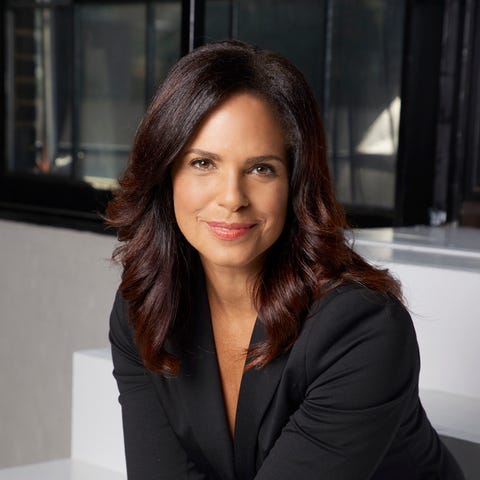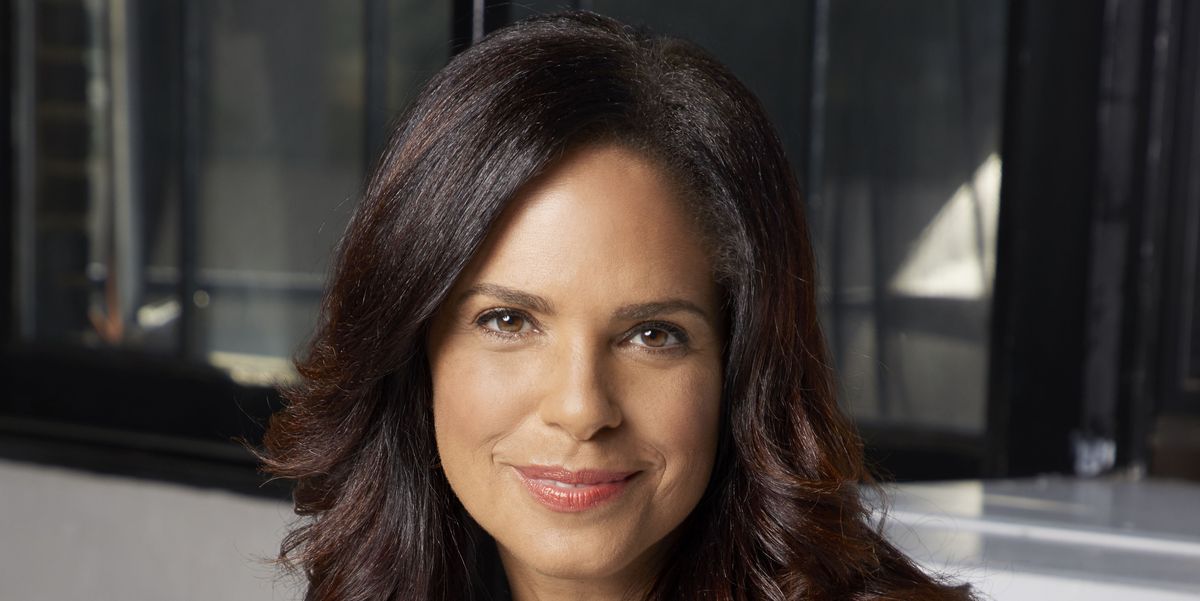
Courtesy of Starfish Media Group.
Soledad O’Brien first heard the starfish story in Haiti, when she was reporting on the unimaginable devastation of the 2010 earthquake. Walking down a beach strewn with starfish dying in the sun, a man comes upon a boy throwing them back into the water, one at a time. When he points out that there are too many starfish, that it doesn’t matter because he’ll never save them all, the boy shrugs and replies, “It matters to the one.”
In many ways, the parable represents O’Brien’s career. She built her reputation by hunting down the stories of individuals and elevating them to the national conversation for a single reason: “Even while you’re telling good stories through individuals, you’re talking about systems,” she says.
Born to immigrant parents—an Australian father and an Afro-Cuban mother—she and her five siblings, all of whom attended Harvard, grew up as one of the few mixed-race families in Smithtown, New York. She was premed but dropped out to start her career at a local Boston television station, where she used her studies to finagle a spot on the medical unit and, as a production assistant, covered the AIDS epidemic. (She later returned to finish her college degree, while pregnant with her first child.) After a stint as a producer with NBC, she went on to become a local reporter and later a correspondent with NBC News. In 2003, she moved to CNN, where she covered national disasters like Hurricane Katrina (for which she won a Peabody) and started the network’s successful documentary franchises Black in America and Latino in America. She eventually rose to run her own production company, fittingly called Starfish Media Group.
Here, O’Brien, who produces and anchors the syndicated show Matter of Fact (owned by Hearst Television, the broadcasting division of ELLE’s parent company), weighs in on the power of saying no, the key to reporting breaking news, and the challenges of balancing a demanding career with a demanding home life.
You credit your parents with being particularly wonderful role models to you and your siblings. When they wanted to get married in Maryland in 1959, interracial marriage was banned. The ACLU asked them to be a test case to challenge the ban, but they declined, drove to Washington, DC, and got married there. What would you have done?
They were very pragmatic people, and a big Supreme Court case would’ve derailed their careers. I think they felt like their life was about fighting the good fight, and that just existing and doing what they wanted to do on their terms was enough. You didn’t have to be engaged in a Supreme Court battle to make your fight worth it. So I would probably have done the same.
It seems that you’ve managed to do both—have a wildly successful career and fight the good fight yourself, particularly through the stories you choose to cover. What issue are you focused on right now?
I just finished a documentary about college students who have to make the decision of paying for school or eating. They’re literally hungry. People often say, “Well, when I was in college, I ate ramen.” This is very different. A lot of colleges have food pantries, but that’s sort of like saying, “Everyone comes in bleeding all the time, but what we’ve done is we have a giant box of Band-Aids.” Well, good for you, but maybe we need to figure out a better solution so people aren’t bleeding.
You’ve reported breaking news, and you’ve produced long-lead documentaries like this one. Are you drawn to one type of storytelling more than another?
With docs, you get the same feeling you get when you deliver a baby: “Ten fingers, ten toes, I can’t believe the miracle that has happened!” Breaking news is often a bit more like making sausage. You land, you run, you try to pack the right stuff in, and you try to get through and do a good job. I’m very fast on my feet. If plan A doesn’t work out, I go to plan B pretty quickly, and I can go to plan C, too. One day, I was driving in Haiti [following a story after the 2010 earthquake], and all of a sudden a tank pulled up in front of us, across the sidewalk, to break into a bank. I [immediately thought that] we should record this. Turns out, it was the UN going in to take money out of the banks. It was amazing! And it ended up being a great story.
You made a name by parachuting into natural disasters—the Haiti earthquake, the 2004 tsunami in Indonesia, Hurricane Katrina—and interviewing people in arguably their darkest moments. Does one interview stand out as the most challenging?
I interviewed a guy who was looking for his three-year-old son during the tsunami, and that was so painful. The kid had so much sunscreen on that when the dad shifted his grip, the kid popped out of his hands and floated away. He kept saying to me, “But he has water wings, he has water wings.” I couldn’t imagine the guilt.
You reported that tsunami story shortly after you’d given birth to your twin sons, which meant that you had four kids under the age of four at home. And yet you hopped on a plane and hit the ground running. How were you able to do it?
It’s not magic. You just have to make sure you’re putting a scaffolding in place to make it happen. You can’t do it if you don’t have good babysitting, if you don’t have a helpful spouse, if you don’t have an in date and an out date. Not every juggle is worth it. For me, it was worth it.
You’re talking to someone who has a seven-week-old in the next room, and is in the middle of figuring out how to juggle when to say yes and when to say no.
Say no to everything! You have to think about building your career, but there’s a whole lot of stuff you can cut out. Anybody who’s asking a favor of you? Say no. Anything you’re being asked to do essentially for free that isn’t going to grow your career? Say no. Anything where you don’t absolutely love the person asking? Say no! When you have little kids, it’s a zero-sum game. If I was going out at night, that meant I wasn’t going to help someone with math homework.
In between reporting, producing, and math homework, do you get any time to read? Or do you relax in a different way?
I’m reading Ten Percent Happier, by Dan Harris. And I’m really trying to get into meditation. I suck at it. I sit down to meditate but end up starting a list. My first two minutes are great, and then I’m like, “Oh crap, I need butter. And almond milk. And eggs.” Then I try to create a mnemonic device around what I need—and [now] it gets ridiculous—and I get up and grab a pen and am like, “Gosh, did no one put away the clothes last night?” My mental focus is terrible. But I’m really working on it.
This article originally appeared in the October 2019 issue of ELLE.
